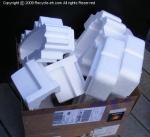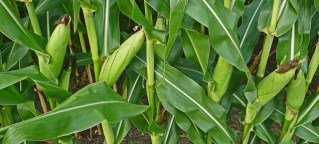 Everyone tosses that foam packaging that comes with our favorite electronics, right?
Everyone tosses that foam packaging that comes with our favorite electronics, right?
Not any more.
Since the 1990’s, Dart Container Corp.– a leader in the polystyrene foodservice product industry – has been collecting polystyrene (generally called StyrofoamTM, a product developed by the Dow Chemical Company) at their drop-off centers, keeping it out of landfills.
They began at their corporate headquarters in Michigan, says Michael Westerfield, Dart’s Corporate Director of Recycling Programs.
Since then, the drop-off program has grown.
In 2007, Dart collected and recycled 106 tons of foam at the Michigan location. In 2008, doing nothing different, they recycled 200 tons of foam. In 2009, they recycled 250 tons, again altering nothing.
Since the 1990’s, the amount and kinds of recycling has steadily grown, practically exploding the past several years.
Recognizing the public’s interest, Dart rolled out its drop-off program at all their 13 plants across the country.
Since then, they’ve developed several types of recycling programs.

Dart can now recycle school foam lunch trays
A Stockton elementary school decided they wanted to recycle their foam lunch trays. Laura Rodriguez, a teacher there, contacted Dart, and now there’s a lunch tray recycling program.
Students participate to make the program work. A video on Dart’s website shows the creative ways students came up with to keep the trays clean so they can be recycled. With their help, the school has been able to recycle 90% of their school lunch trays!
Teacher Laura Rodriguez said: “It’s a tiny bit of work to clean your tray but it’s a big payoff.”
With the program’s success, the school has eliminated one day of trash pick-up, giving them big financial savings.
A machine Dart invented specifically for this program compacts up to 1,200 lunch trays into a small log. These get converted into flower pots – which the school then sells as fundraisers – or plastic lumber, video cassettes or picture frames. And all that polystyrene stays out of the landfill.
Dart has several other recycling programs.

Dart's Recycla-Pak
Any store or company that regularly uses polystyrene can sign up with Dart’s Reclca-Pak programand begin collecting foam cups. They can use their own box or buy a Recycla-Pak corrugated collection bin from Dart, says Westerfield. Dart’s bin doubles as a collection and a shipping device.
Dart’s CARE – Cups Are REcyclable – program is designed to collect and recycle Dart’s own foodservice containers. Any business can start its own CARE program, collecting and separating their foam foodservice containers from other recyclables. These are shipped back to Dart, which uses a densifier to crush the foam into lightweight, cone-shaped cylinders. Dart transports them to certified recycling centers where these are turned into products like plastic molding and plastic lumber.
The EPA’s Office of Solid Waste has said this is the kind of program they’d like to see adopted in corporate America.
Dart stays ahead of the curve. “And we’re not resting either,” said Westerfield.
They’re working to establish curbside polystyrene foam recycling. It’s already set up in Tracy and Los Angeles, where foam products are added into their single stream recyclable bin.
And, says Westerfield, they’re close to having 40-50 curbside recyclers just in California alone!
“Dart is making foam recycling easier,” he said.

Dart's new PET cups help educate consumers on recycling
Dart recently introduced a PET cup with 20% post consumer recycled plastic in it. Each of these bright colored hot and cold beverage cups come imprinted with one of ten facts about foam’srecyclability and how this compares environmentally to similar paper-based products.
The messages invite consumers to learn more at Dart, reinforce its nationwide efforts to promote polystyrene recycling and helps dispel the misperceptions about foam’s environmental attributes.
The messages include facts such as:
- An average weight paper hot cup with a cardboard sleeve requires 47% more energy to produce than a comparable foam cup.
- An average weight paper cold cup generates 148% more solid waste by weight than a comparable foam cup.
- An average weight paper hot cup with a cardboard sleeve generates 257% more solid waste by weight than a comparable fusion cup.
To find out more about Dart’s recycling programs, check out www.dart.biz.
Filed under: Exciting New Deveopments | Tagged: Dow Chemical, energy, environmental, EPA, landfill, PET, plastic, polystyrene, recycle, recycling, styrofoam | Comments Off on Dart makes recycling styrofoam easy





 Everyone tosses that foam packaging that comes with our favorite electronics, right?
Everyone tosses that foam packaging that comes with our favorite electronics, right?

